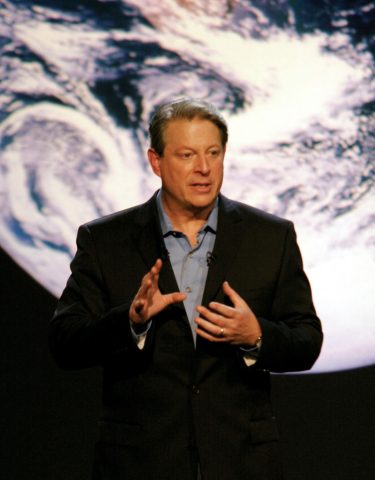The Most Influencial Environmental Activis

Artificial Intelligence and Machine Learning
March 22, 2019
Boost Your Productivity with these Time Management Tips
April 4, 2019
The UN Intergovernmental Panel on Climate Change (IPCC) has warned that we have just twelve years until catastrophic climate change becomes irreversible.
The world’s leading climate scientists agree action needs to be taken now.
Instead of the World’s current swathe of autocratic, “strong man” leaders, the world is desperately in need of environmentally-literate movements and leaders who can make the changes the world so desperately needs.
Business Optimizer considers some of the people who are leading the debate: the world’s most influential environmental activists.
Al Gore
Is Al Gore the best President America never had? If those legal decisions about the disputed vote counts in the state of Florida had gone the other way, we could be living in a very different world right now.
Instead, Gore turned his attention to environmental science; winning the Nobel prize with the Intergovernmental Panel on Climate Change for their joint work in 2007. The Nobel panel recognised “their efforts to build up and disseminate greater knowledge about man-made climate change, and to lay the foundations for the measures that are needed to counteract such change.”
His landmark documentary An Inconvenient Truth talked about “climate chaos” for the first time – arguing climate change is too benign a word for the potential effects of the environmental havoc humanity is wreaking on the planet’s delicate ecosystems. In 2017, Gore followed up with An Inconvenient Sequel in which he called for urgent action.
Naomi Klein
The award-winning journalist has penned many influential international bestsellers: No is Not Enough: Resisting Trump’s Shock Politics and Winning the World We Need (2017), This Changes
Everything: Capitalism vs The Climate (2014), The Shock Doctrine: The Rise of Disaster Capitalism (2007) and No Logo (2000).
Since This Changes Everything was published, Klein has been a vociferous campaigner. She is one of the organisers and authors of Canada’s Leap Manifesto, a blueprint for a rapid and justice-based transition from fossil fuels. In 2016, she was awarded Australia’s prestigious Sydney Peace Prize for “exposing the structural causes and responsibility for the climate crisis, for inspiring us to stand up locally, nationally and internationally to demand a new agenda for sharing the planet that respects human rights and equality, and for reminding us of the power of authentic democracy to achieve transformative change and justice.”
Find out more: http://www.naomiklein.org/main
Greta Thunberg
It’s not often a sixteen-year-old school girl makes such a huge impact on the world. But Thunberg’s lone protest last summer has morphed into a galvanising global movement.
Her powerful speech at Davos inspired many children and adults alike. By encouraging fellow pupils to take time off school to protest the inaction of politicians, the movement Thunberg has inspired is challenging the world’s leaders to act. And now.
Find out more: https://www.youtube.com/watch?v=0TYyBtb1PH4
Pavan Sukhdev
Former international banker by training, scientist, and environmental economist by passion, Pavan campaigns on sustainability and the invisible economics of nature. This work led to his appointment to head the United Nations’ “Green Economy Initiative” and the G8+5 study The Economics of Ecosystems and Biodiversity (TEEB).
Find out more: https://www.ted.com/speakers/pavan_sukhdev
George Monbiot
The British author was presented with a United Nations Global 500 Award in 1997 by Nelson Mandela for outstanding environmental achievement. Since then, he has written several influential books: Feral: Searching for Enchantment on the Frontiers of Rewilding (2013) and Captive State: The Corporate Takeover of Britain (2000) and continues to write and campaign on environmental topics. He is the founder of The Land is Ours, a campaign for the right of access to the countryside and its resources in the United Kingdom.
Find out more: https://www.monbiot.com/
James Hansen
This former NASA scientist has been fighting the battle for American policy leaders to, first, accept climate change science and, second, act on it since the 1970s.
“All we’ve done is agree there’s a problem,” Hansen told the UK’s Guardian in 2018. “We agreed that in 1992 at the Earth summit in Rio and re-agreed it again in Paris at the 2015 climate accord.
We haven’t acknowledged what is required to solve it. Promises like Paris don’t mean much, it’s wishful thinking. It’s a hoax that governments have played on us since the 1990s.”
In his 2012 TED talk, Hansen called on us all to help him communicate the gravity and urgency of climate chaos to those in a position to do something about it.
“The solution isn’t complicated, it’s not rocket science,” Hansen has said. “Emissions aren’t going to go down if the cost of fossil fuels isn’t honest. Economists are very clear on this. We need a steadily increasing fee that is then distributed to the public.”
Find out more: https://www.newyorker.com/news/daily-comment/listening-to-james-hansen-on-climate-change-thirty-years-ago-and-now



